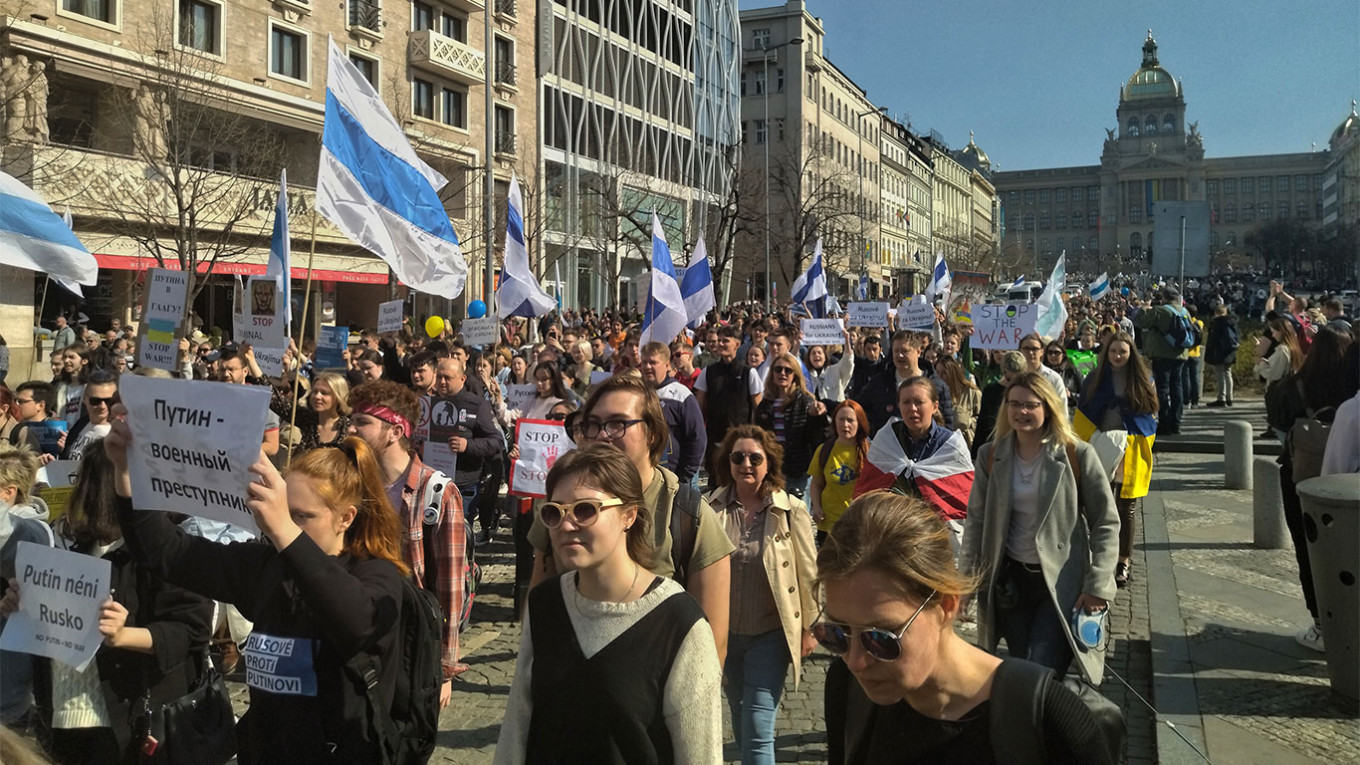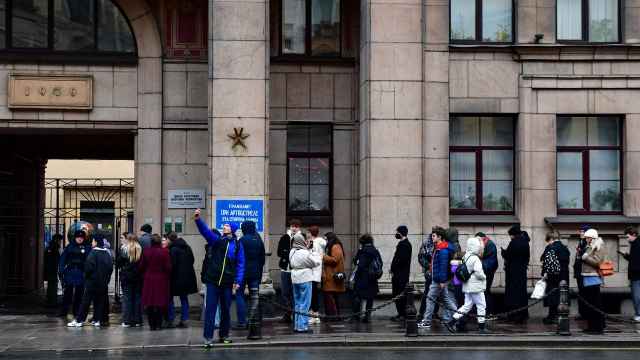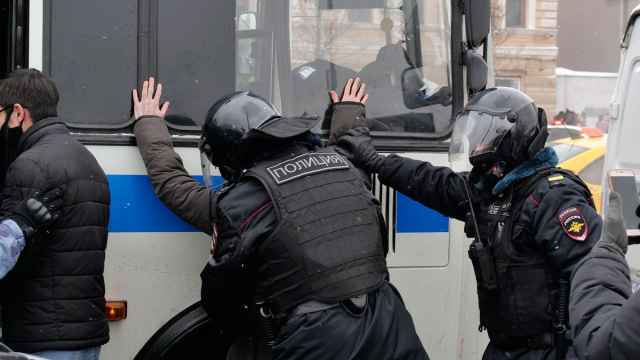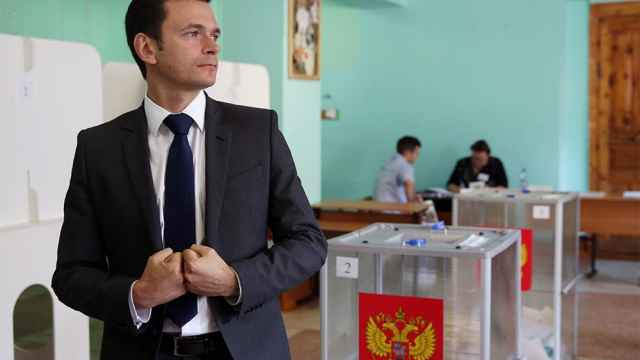As a new year dawns, the prospects for the war in Ukraine look bleak. The Ukrainian counteroffensive did not deliver the major breakthrough some expected. Sanctions have not only failed to deliver a knockout blow to Russia but have caused elites to rally around the regime. The West has so far failed to establish sufficient arms production to supply Ukraine, and the world’s attention has now been diverted to the conflict in Israel. As the U.S.-based Institute for the Study of War warns, if the West continues to delay expanding aid to Ukraine, it could lose the war next year.
All the while, Russia’s opposition appears to be in a particularly hopeless position. After authorities swiftly crushed anti-war protests in the first months of the invasion, the world's hopes for domestic resistance to the war have all but faded. The exiled opposition has surprised European politicians, and even themselves, with the depth of their internal divisions.
In October, the Netherlands Institute of International Relations held a workshop to discuss possible scenarios for Russia’s future after Vladimir Putin’s presidency. The academics concluded that the country’s domestic opposition was far less likely to bring about this future than the state of Putin's health, the actions of the Ukrainian army and the international anti-Putin coalition, as well as the influence of China and global oil prices.
While the opposition is physically removed from Russia, they are not powerless. In her study of the Arab Spring, American sociologist Dana Moss identified five key ways that diasporas helped fuel the anti-government protests that spread across much of the Arab world in 2011. They allowed the opposition to overcome censorship by passing information to domestic and foreign audiences. They connected revolutionaries to one another, as well as with foreign media and politicians, and acted as their representatives abroad. They provided material aid and shared skills acquired abroad, and some returned to their home countries to participate in the protests themselves.
Political scientist Yossi Shain, who studies exiled opposition movements, points out that activists can also help Russians flee the regime, develop strategies for anti-Kremlin forces still inside the country, and articulate an ideology that unites its supporters.
Russia’s opposition fulfills all of the above functions. Their media outlets continue to fight Kremlin propaganda and connect Russians to each other and the outside world. The Platform for Anti-War Initiatives, whose work gets less attention than the high-profile conflicts between opposition factions, coordinates the work of opposition organizations and represents Russians in the European Parliament.
Anti-war organizations continue to support political prisoners, evacuate deported Ukrainians and persecuted activists, and help Russian men evade military service and desert from the front lines. Anti-war Russians have established their own flag, songs, literature, exhibitions, and cultural spaces. For example, the Returning the Names commemoration of victims of Soviet repression, united communities of Russians, Belarusians, and Ukrainians around the world in 2022-23.
Even a defeated and ousted opposition remains capable of influencing its home country. To do so, Shain argues, it needs to convince its domestic supporters that it holds sway among foreign governments, demonstrating that it can protect their interests better than the current regime. To the international community, the opposition in exile must show that it still has supporters inside the country whom it can mobilize when the time comes.
This is where Russia’s exiled opposition needs to demonstrate success. The need for them to organize is urgent as there are areas where they could have a significant impact on the course of the war.
For one, they could help ensure that Russian army defectors are granted asylum in countries where they have no risk of being extradited to Russia. Research shows that people are more likely to defect if there is a safe haven available, which in turn can drain the military of manpower and cause instability among the ranks.
Most European countries accept Ukrainian draft dodgers and refuse to extradite them back home. But they do not do this for Russian draft dodgers. This plays into the hands of Putin's regime, which has a much larger population to draw on for soldiers. Systematic support for defectors would demonstrate to war-weary Russians that the West is not fighting the Russian people. At the same time, involving deserters in anti-war activities could even make it possible to build resistance to the war within the Russian army.
What little support does exist for Russian defectors remains largely symbolic, even though more than 60 anti-war organizations from around the world have signed an appeal asking the European Parliament to develop protection measures for conscientious objectors and defectors. Germany and France have indicated a willingness to grant asylum to Russian deserters and evaders, but their actions do not live up to their words. Germany has granted asylum to only 131 applicants out of 4,074.
The Russian opposition could also devise a way for personal sanctions to be lifted from those who show opposition to the war and the Kremlin. Politician Dmitry Gudkov, investor Andrei Movchan, economist Maxim Mironov, and Maria Pevchikh, chair of the board of the Anti-corruption Foundation, have spoken about the need for such a mechanism. There is clearly interest from Russia’s elite, too, as politicians Leonid Volkov and Maxim Katz have both spoken of being approached by sanctioned businessmen who asked for their help. If the opposition could facilitate this, it could split Russia’s elite by showing they had another option.
However, in the absence of such options, these elites are forced to rally around Putin. Oligarchs loyal to the regime, such as Grigory Beryozkin, owner of RBC (and previously Komsomolskaya Pravda, a propaganda mouthpiece for the Kremlin), are trying to lift sanctions against them through lobbying and campaigns to whitewash their business in the Western press, rather than through negotiations with anti-war forces.
Russia’s presidential election in March provides the opposition an opportunity to make some gains. Of course, the election results are a foregone conclusion — Kremlin spokesman Dmitry Peskov said himself that Putin will be elected with 90% of the vote. However, periods in the lead-up to elections are difficult times for electoral autocracies like Russia. They have to win citizens over by fulfilling promises to improve their lives. As the new year dawns, Russian citizens are still suffering from higher prices for fuel, eggs and chicken. People also pay closer attention to politics before elections, which makes it a good time for the opposition to build organizations to organise protests.
The opposition could have turned this election into a fully-fledged anti-war campaign by consolidating what remains of their movement within Russia around a single candidate. But predictably, Russian authorities prevented independent candidates from even collecting signatures. In this context, the opposition faces the question of how to capitalize on the period of vulnerability for Putin's regime. The exiled opposition has a critical role to play in this, as they can draw attention to the needs of their allies within the country.
Moreover, the opposition needs to prepare for what will come after the elections. Analysts believe a new wave of mobilization in the spring is almost inevitable, which makes it essential to develop ways to stop Russia’s army from amassing further strength. While the global coalition of Ukraine’s allies is in disarray, the Russian opposition has to seize this opportunity to launch a domestic counteroffensive and show that people were wrong to write it off.
A Message from The Moscow Times:
Dear readers,
We are facing unprecedented challenges. Russia's Prosecutor General's Office has designated The Moscow Times as an "undesirable" organization, criminalizing our work and putting our staff at risk of prosecution. This follows our earlier unjust labeling as a "foreign agent."
These actions are direct attempts to silence independent journalism in Russia. The authorities claim our work "discredits the decisions of the Russian leadership." We see things differently: we strive to provide accurate, unbiased reporting on Russia.
We, the journalists of The Moscow Times, refuse to be silenced. But to continue our work, we need your help.
Your support, no matter how small, makes a world of difference. If you can, please support us monthly starting from just $2. It's quick to set up, and every contribution makes a significant impact.
By supporting The Moscow Times, you're defending open, independent journalism in the face of repression. Thank you for standing with us.
Remind me later.






